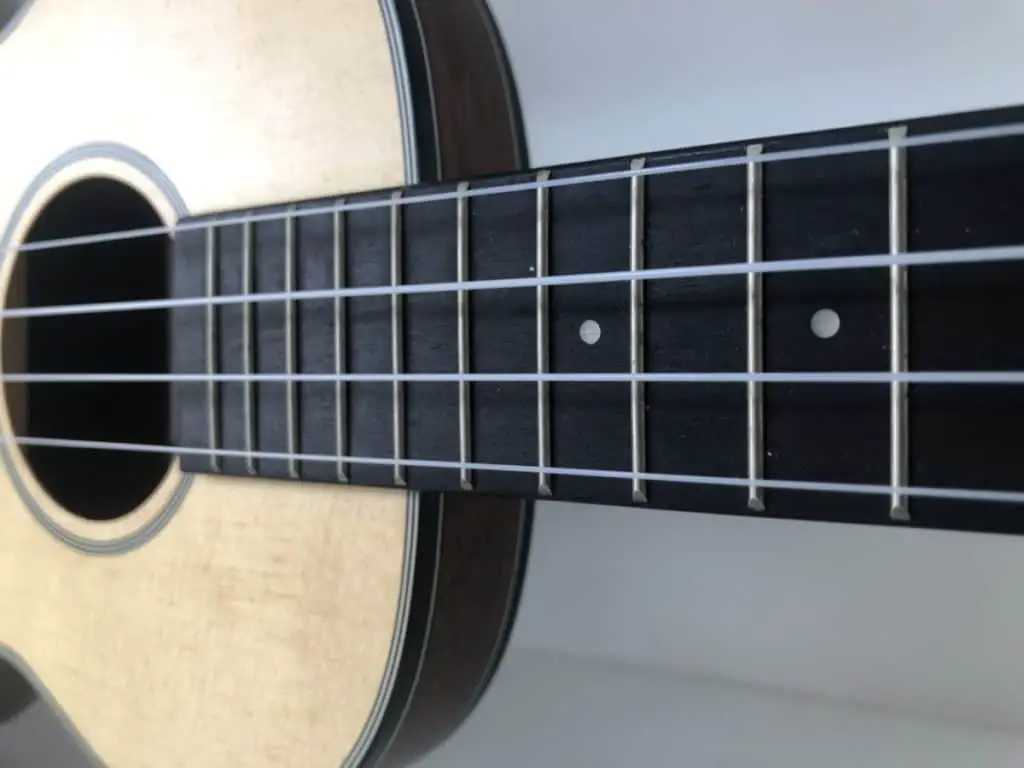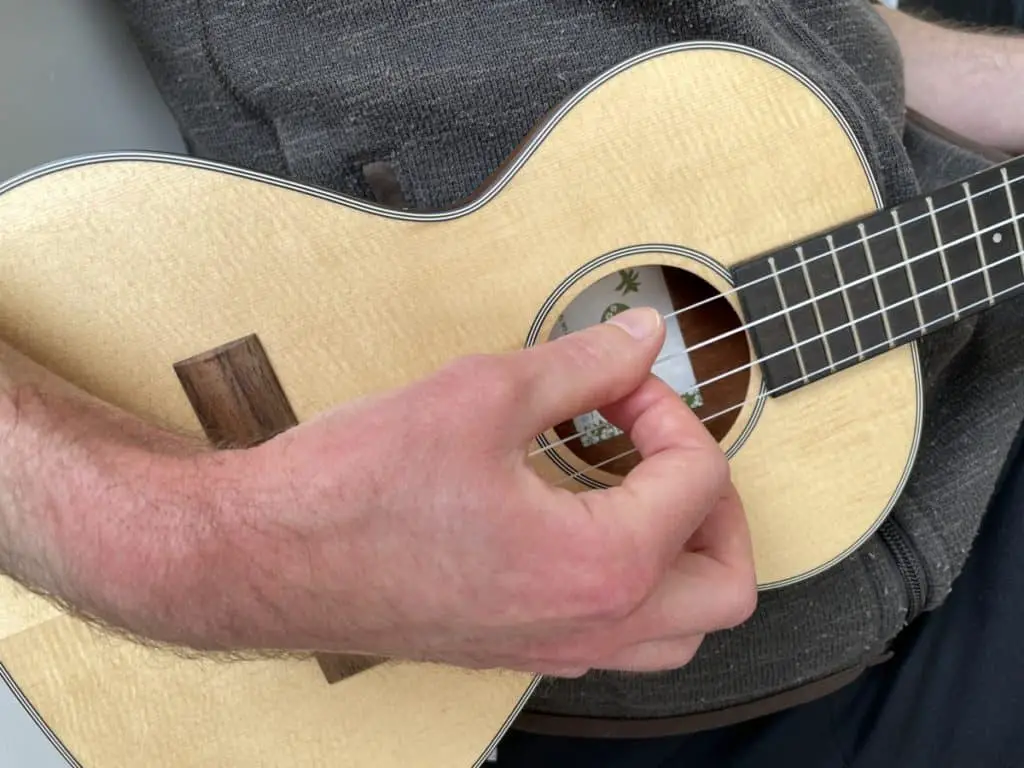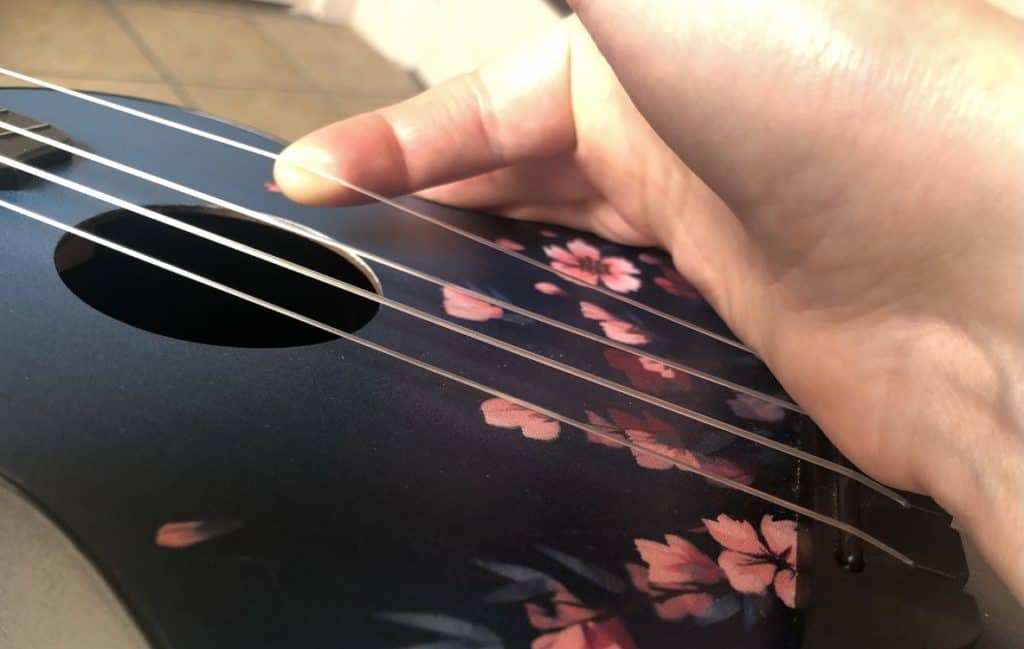Today I am going explain whether ukulele strings break easily (or if they’re actually pretty durable).
I have snapped a couple of uke strings in my time, so let’s get straight into it!
As a general rule, ukulele strings do not break easily. In fact, uke strings are more durable than guitar strings. Ukulele strings are under less tension compared to guitar strings, which makes them less likely to snap. Nylon ukulele strings are also less prone to oxidation and other string problems.
That just scratches the surface of this topic, and it is definitely possible to break ukulele strings, so let’s dig deeper.
3 Reasons Ukulele Strings are MORE Durable than Guitar Strings

When we talk about whether ukulele strings are “easy” to break, this naturally raises the question: “compared to what?!”
So, I think the easiest way to illustrate the durability of ukulele strings, is by comparing them with standard guitar strings.
So let’s do that:
1. Wound vs Unwound
Ukulele strings are usually not wound strings, which just means it is one solid thread of material. Unwound strings are usually pretty strong compared to wound strings.
Wound strings are comprised of a core material with a wire-like wrap around the outside.
The lowest pitch strings (like the low E and A strings) on a guitar are typically wound, and wound strings have more potential points of failure, which naturally makes them more prone to breaking.
2. Nylon vs. Metal
One of the reasons Ukulele strings snap far less than strings on a guitar comes down to material. The nylon-based strings of a uke are significantly lighter than a steel string.
Due to being more lightweight, nylon strings contain far less tension than steel strings, which gives the string less opportunity to snap under the weight of itself.
In addition, the metal used to produce guitar strings (usually steel) is prone to oxidation and even rusting. This is a problem you simply don’t have to worry about with plastic ukulele strings.
3. Stress (How Ukulele Strings are Played)
The way ukuleles are played also has a profound effect on the longevity of its strings. Ukulele players often use the thumb on their dominant hand to gently strum the strings near the center of the instrument’s body.

This action is far less abrasive than a pick raking across steel strings.
All of this only rings true given that you are playing the ukulele in a “standard way”.
And with all of this said, ukulele strings aren’t invincible, so let’s talk about how frequently they tend to break.
How Often Ukulele Strings Break
It is very rare to break ukulele strings. You could play for 5-10+ years and never break a single ukulele string. With that said, you could still break a string if there is something abrasive rubbing them, if you play to harshly, or if your strings get excessively worn and you don’t replace them.
I’ve personally played the ukulele for several years, and I’ve never broken a string.
That being said, if you are a frequent player, the strings on a ukelele will stress over time – which usually leads to a few undesirable qualities before the nylon unravels on you.
Put another way, you can often tell when your strings are getting worn, before they ever snap:
How to Spot Ukulele String Wear & Tear
Ukulele strings do show signs of aging and weathering over time. It is usually readily apparent that it is time for new strings long before a snapped one forces the issue.
Two things that are fairly easy to spot, are as follows:
- Strings start to fray over time, and with use
- The clarity of the strings’ tone will decline over time
If you notice either of these issues starting to creep up on your ukulele strings, then you should put on a new set of strings.
If you’re not sure if your ukulele has either of the issues above, it helps to compare with a new set of strings. So, if you have a 2nd ukulele, or a friend with a ukulele, or just a spare set of new strings, you can use any of those options for comparison (as long as your comparison ukulele strings are new).
As a rule of thumb, it’s also recommended that that you change your ukulele strings about every year. So, if you don’t run into any of the above issues before you hit the 1-year mark, then it’s still a good idea to replace the strings after one year, especially if you play regularly.
2 Other Reasons Your Ukulele Strings Might Break
In addition to the wear & tear signs I just covered, I thought it was worth covering 2 other reasons your uke strings might break.
1. Improper Playing Form
As a self taught musician, I wear improper form as a badge of honor. I do not see approaching an instrument with your own style as a negative trait in the slightest – but your instrument may not share that sentiment.
For example, the proper form for strumming the ukulele involves resting your palm on the bridge of the instrument. This ensures that you aren’t inadvertently slowly pulling the bridge off of the small wooden instrument as you access the frets.
In other words, think about putting a stick underneath something heavy and using leverage to pick it up – This is what we want to avoid with the neck and bridge. Damaging the bridge like this over time will lead to a decrease in string longevity and stability.
2. Using The “Wrong” Tools For The Job
Much like my take on improper playing form, I do not believe there is anything off limits when it comes to creating noise and music with an instrument. It still remains true that importing tools from other instruments to a uke format it wasn’t built for, will result in increased damage to strings.
The most apparent example of this is the use of picks on a ukulele. Due to the lightweight and loose nature of a uke’s nylon strings, specially made picks made from felt are favored by ukulele players.
Standard plastic guitar picks are thinner, denser, and far less delicate than a ukulele felt pick.
Although the motion and function are the same, the materials used make the two feel completely foreign from each other. If you take a guitar pick to your ukulele strings – something I am definitely guilty of from time to time – you will burn through your strings much quicker than expected.
Does It Hurt When You Break A Ukulele String?
It is unlikely to hurt your fingers if you break a standard ukulele string while playing. The tension of ukulele strings is fairly low, and the plastic strings aren’t particularly sharp. It’s also more likely for ukulele strings to fray or unravel then it is for them to snap, making string-related injuries uncommon.
If you pair this with the fact that ukulele strings only snap in very rare circumstances, you will probably never need to worry about a painful string snap from your ukulele.
To be fair, it’s not impossible to hurt your hand with ukulele strings. It is still a solid material placed under tension. But the odds of your string snapping while you’re playing AND that also happening with enough force and direction to cause pain, is quite low.
How To Prevent Ukulele Strings From Breaking
Although not something most players should stress too much about, there are a couple of tips and tricks to ensure you are getting the most life out of your strings.
1. Stretch Out Your New Strings (for Break-In)

When you get around to putting a new set of strings on your uke, make sure to give them some attention.
With any stringed instrument, it is best to break the strings in right away.
Once on the instrument, lightly pull on and bend the strings between tuning to help lock the string tuning in. Properly caring for and breaking in a new set of strings can do wonders for the lifespan of strings on any kind of instrument.
To learn more, check out our separate article with tips on breaking in ukulele strings.
2. If You are Already Breaking Strings, Try This…
If you find yourself frequently breaking your ukulele strings, you should first check if there is a structural issue (maybe another component of the ukulele bending or scratching the strings incorrectly). If you can’t find anything yourself, you could consider having a professional take a look also.
If there are no structural issues, then maybe it’s time to experiment with a new brand of strings, especially if you’ve been using cheap off-brand strings.
There are a seemingly endless number of companies manufacturing ukulele strings. Though often not readily obvious, different strings are unique to each other in gauge, build, specific material, etc.
Maybe your playstyle is not well suited to the build of the strings you’ve been using. Try a new set of strings every and see if it lasts longer.
This process will lead you to having an informed opinion on different types of ukulele strings – and most importantly, an opinion on which one works best for you.
3. Replace Your Strings Regularly
I already mentioned this one above, but just to briefly recap, you should be replacing your strings about every year.
Or, when the strings show signs of wear & tear, whichever of these happens sooner.
By keeping your strings well maintained, you will further decrease your chances of one breaking on you.
